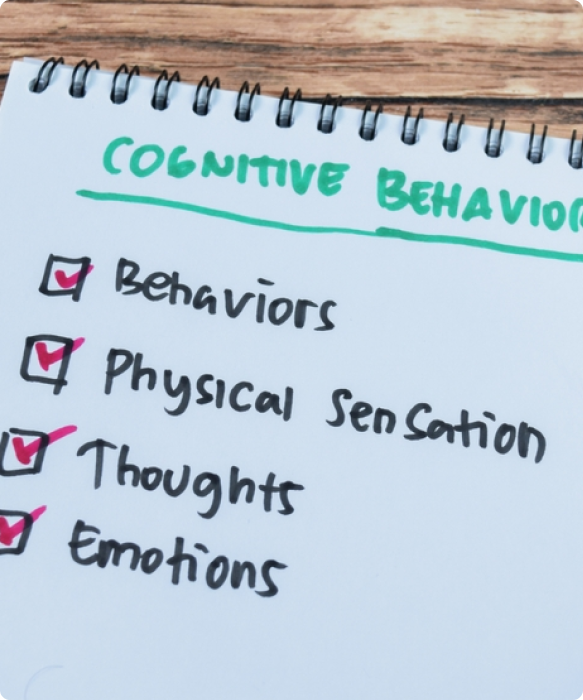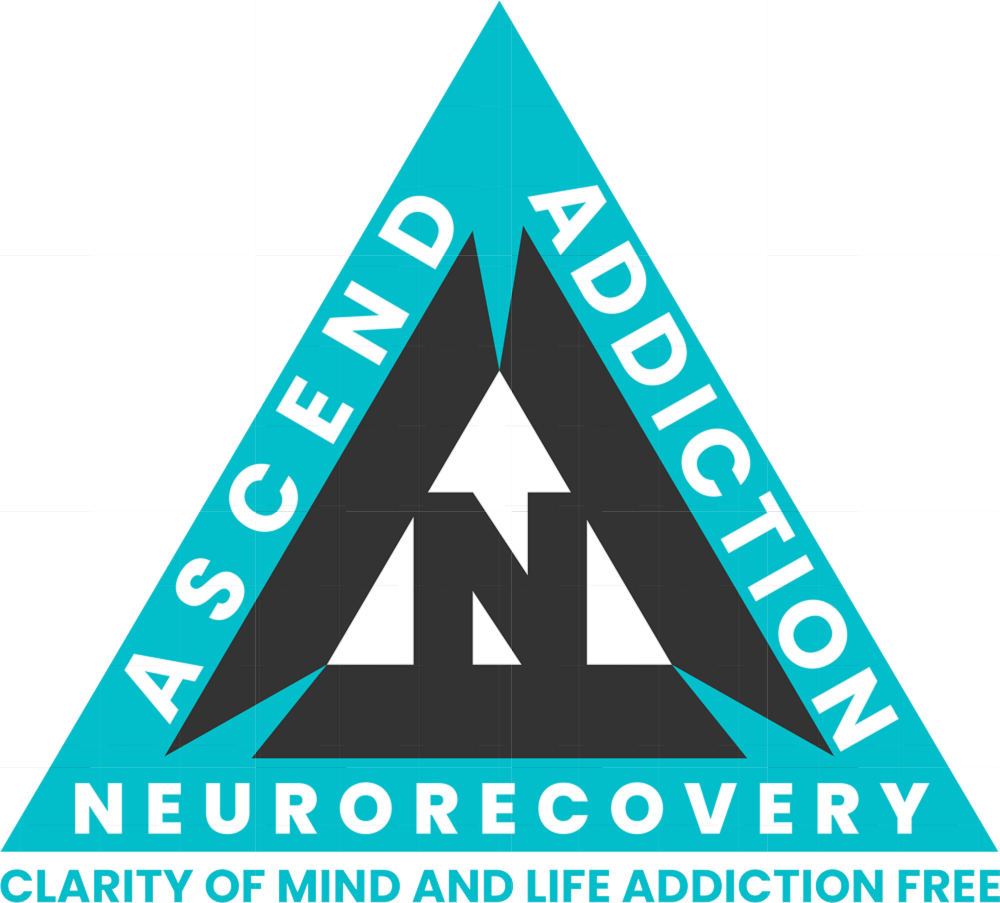Ascend Addiction NeuroRecovery
Transformative Cognitive-Behavioral Therapy for Lasting Change
At Ascend Addiction NeuroRecovery, we offer evidence-based cognitive behavioral therapy (CBT) services to help individuals struggling with substance use disorders (SUDs). Our experienced therapists develop personalized treatment plans designed to address the root causes of addiction, empowering clients to regain control of their lives. Through structured therapy sessions and compassionate care, we support individuals in their journey toward recovery, equipping them with the skills to achieve long-term sobriety.
Are you prepared to take the first step to recovery? Get in touch with Ascend Addiction NeuroRecovery right away to find out how our customized CBT therapies can help you.

What Is Cognitive-Behavioral Therapy?
Cognitive-behavioral therapy (CBT) is a scientifically proven therapeutic approach that helps individuals recognize and modify harmful thought patterns and behaviors. This therapy focuses on understanding the connection between thoughts, emotions, and behaviors, enabling individuals to develop more effective and healthier coping mechanisms. When it comes to treating addiction and mental health issues, CBT has an excellent standing.

What Is Cognitive-Behavioral Therapy?
Cognitive-behavioral therapy (CBT) is a scientifically proven therapeutic approach that helps individuals recognize and modify harmful thought patterns and behaviors. This therapy focuses on understanding the connection between thoughts, emotions, and behaviors, enabling individuals to develop healthier coping mechanisms. CBT is widely recognized as an effective treatment for addiction and co-occurring mental health conditions.
What to Expect from Cognitive-Behavioral Therapy
At Ascend Addiction NeuroRecovery, our CBT program is structured to promote selfawareness, emotional regulation, and positive behavioral changes. Throughout your therapy sessions, you can expect:
- Cognitive Restructuring – Identifying and challenging negative thought patterns that contribute to addiction.
- Emotional Regulation – Learning mindfulness, relaxation techniques, and coping strategies to manage stress, anxiety, and emotional distress.
- Behavioral Modification – Developing new habits and engaging in fulfilling activities to replace destructive behaviors related to substance use.
How Cognitive-Behavioral Therapy Supports Addiction Recovery
CBT is a goal-oriented and practical approach that teaches individuals to recognize and counteract destructive thought patterns that lead to substance use. During therapy, our clinicians work closely with clients to
- Identify triggers that contribute to cravings and substance misuse.
- Develop coping mechanisms for managing high-risk situations.
- Implement healthy decision-making strategies that promote long-term sobriety.
- Build self-awareness and resilience to prevent relapse.
Benefits of Cognitive-Behavioral Therapy for Addiction Recovery
Engaging in CBT therapy at Ascend Addiction NeuroRecovery offers numerous benefits, including:
- A deeper understanding of personal triggers and addictive behaviors.
- Enhanced self-esteem and self-empowerment.
- Stronger coping mechanisms for managing emotions and stress.
- Improved problem-solving and decision-making skills.
- Reduced cravings and urges to engage in substance use.
- A greater sense of control and direction in life.

Find Comprehensive Cognitive-Behavioral Therapy at Ascend Addiction NeuroRecovery
Healing ought to be both personal and practical. Every client receives a treatment plan designed for long-term success at Ascend Addiction NeuroRecovery. Our professionals blend CBT therapies with holistic assistance in a safe and supportive environment.
When you or a loved one is ready for real change, Ascend Addiction NeuroRecovery is here to help with tailored, science-backed treatment. For more information about our CBT therapeutic services and to restart your addiction-free life, call us at +1 403-351-1100 or visit our website today.
FAQs
Have Questions? We
Have Answers!
Browse through our frequently asked questions to find the answers you need
about our programs, enrollment, and training process
Yes. At Ascend Addiction NeuroRecovery, CBT is designed to address the intersection of addiction and mental health conditions like anxiety or depression. These conditions often share underlying thought distortions that fuel both substance use and emotional struggles. Through structured strategies, CBT helps clients challenge these distortions, regulate mood, and build healthier coping mechanisms. By treating both simultaneously, Ascend Addiction NeuroRecovery creates a more holistic recovery path. This dual focus also restores mental balance, making long-term healing more sustainable.
Automatic thoughts often surface without conscious awareness, driving cravings and relapse behaviors. At Ascend Addiction NeuroRecovery, CBT helps clients identify these patterns, challenge their validity, and replace them with healthier alternatives. Through repetition, the brain begins to weaken the old neural pathways associated with destructive habits while reinforcing constructive thought patterns. This process shifts responses from impulsive to intentional. Over time, automatic thoughts lose their control, allowing clients to reclaim agency, break cycles of relapse, and make choices rooted in long-term recovery.
Addiction hijacks the brain’s reward system, linking pleasure to harmful behaviors. CBT at Ascend Addiction NeuroRecovery intervenes by helping clients consciously associate reward with healthier actions. By reframing thought patterns and practicing new responses, CBT activates the brain’s ability to find satisfaction in growth, connection, and stability rather than substances. Over time, the reward system recalibrates, reinforcing these positive behaviors. This neurological shift, paired with structured practice, allows harmful habits to lose their appeal, making sustainable recovery both neurologically and emotionally possible.
Addiction often reduces identity to a single, limiting label. CBT at Ascend Addiction NeuroRecovery helps clients challenge this narrative by addressing the thoughts and beliefs that reinforce shame, guilt, and self-doubt. Through structured reframing, clients learn to separate their behaviors from their worth. This cognitive shift allows space to rebuild identity based on resilience, strengths, and future goals. As new thought patterns become ingrained, clients begin to see themselves as capable, whole individuals, empowered to move beyond addiction into a renewed sense of self.
Yes. Stress is a major trigger for relapse, and CBT directly addresses this vulnerability. At Ascend Addiction NeuroRecovery, clients learn to recognize distorted thinking during stressful moments, then replace reactive responses with constructive coping strategies. By practicing these skills repeatedly, the brain rewires its default pathways, reducing the automatic impulse to seek substances for relief. Over time, stress becomes a signal for mindful action rather than avoidance or escape. This transformation allows clients to face challenges with clarity, stability, and resilience in recovery.
